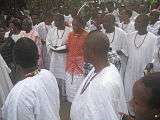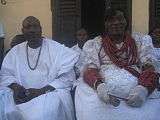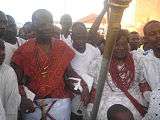Igogo Festival
Odun Igogo |
|---|
|
|
| Status |
active |
|---|
| Genre |
Festivals |
|---|
| Begins |
September |
|---|
| Ends |
October |
|---|
| Frequency |
Annually |
|---|
| Years active |
1601 AD – present |
|---|
| Founder |
Queen Oronsen |
|---|
| Previous event |
September 2014 |
|---|
| Next event |
September 2015 |
|---|
| Area |
Nigeria |
|---|
| Leader |
Olowo of Owo |
|---|
| Organised by |
People of Owo Kingdom |
|---|
| Sponsor |
Olowo of Owo, Ojomo Oluda, Owo Chiefs and Owo Sons and daughters |
|---|
The Igogo festival is a Yoruba festival held in Owo, Nigeria. It is held annually in September to honor Queen Oronsen, a mythical wife of Rerengejen, a legendary King of the ancient Owo Kingdom.[1]
It is a colorful festival in which the incumbent Olowo of Owo and high chiefs of Owo Kingdom dress like women with brass ornaments, coral beads and plaited hair. They celebrate and pay homage to Queen Oronsen at "Ugbo Laja" and "Ugbo Oluwa" in appreciation of her protection.
[2]
During the festival, Olowo dress reflects that of Oronsen's wealth and legend;.
The festival often lasts for seventeen days, during which nobody is allowed to wear a cap in the case of men; and head ties in the case of women. The beating of drums is also usually forbidden and instead metal gongs are used.[3]
History
The Igogo festival began in 1601 AD, during the reign of Olowo Rerengejen, following the departure of Oronsen, a beautiful and affluent queen who was the most beloved wife of Rerengejen, a powerful king and hunter.[4]
Rerengejen met Oronsen in a forest while hunting and asked for her hand in marriage. This beautiful queen agreed to marry the king provided certain terms and conditions were met. Rerengejen, enchanted by her beauty, promised to adhere strictly to her rules.[5]
Queen Oronsen insisted on certain taboos, things she must not see people do in her presence, either accidentally or intentionally.[6]
She insisted that nobody should grind Okra in her presence or pour water into the yard. In addition, anyone arriving from the farm must not lump a load of firewood. The taboo is a negation of the common domestic activities in the palace.[7]
King Rerengejen promised that none of these rules would be violated and the Queen agreed to marry him. King Rerengejen cautioned the other wives not to carry out any of these activities and this warning provided a clue of her taboos.[8]
Although, Oronsen has married many powerful Kings who probably do not fulfill similar promises after a trial.
Queen Oronsen has the mystical power to produce quality beads which enhanced King Rerengeje's riches and affluence. This led to the King placing a higher value on her than the senior wives, who were all jealous of the adoration and love shown by Rerengejen.[9]
One day, Queen Oronsen had a minor rift with the other senior wives of the King. They conspired against her with the intention of violating her taboo while Rerengejen was not in the palace. The confrontation resulted in an immediate vacating of the palace.[10]
While she was running out of the palace, some palace guards and chiefs ran after her to bring her back, an effort that was futile.[11]
She later felt tired and waited at a place called "Ugbo Laja" where she was persuaded to return to the palace. Her refusal frustrated the guards into forcefully capturing her but she disappeared into "Igbo Oluwa", now a sacred forest, leaving her head ties (oja) at "Ugbo Laja" which the guards returned to King Rerengejen. "Ugbo Laja" is now a sacred grove.[12]
Queen Orosen's terra cotta sculptured image from "Igbo Oluwa" by Ekpo Eyo stood at a distance to inform the Owo people that nothing will bring her back to the palace but that annually they should always sacrifice two hundred items of different articles, such as dried fish, kolanut, Aligator pepper, bitter cola and many more for ritual (Igogo) and in return she promised to protect the Kingdom.[13]
The people of Owo, led by King Rerengeje promised to follow her instructions. This marked the birth of the "Igogo festival".
The drama behind Queen Oronsen's departure from the palace and the sacrifice at the sacred grove, "Ugbo Laja" are the basis of the Igogo festival.[14]
Chronology of events
The festival is often held in the middle of September but is sometimes held before then.[15]
On the first day of the festival, men called "Ayooyo" of the Iloro quarter of Owo from the lineage of the guard that returned Oronsen's head ties to King Rerengejen, dress in black Ofi (a traditional attire) with a long stick and Cow hoof and dance round the town, following a visit to the palace. Before the day runs out, they must visit "Ugbo Laja" to pay homage to Queen Oronsen.[16]
On day two of the festival, the incumbent Olowo sends a sheep to "Ugbo Luwa" through Chief Obata and Obajo, who will eventually end the festival in the last day of the events.[17]
During the festival, the incumbent Olowo of Owo visits "Ugbo Laja" to pay homage to the goddess, Queen Oronsen. There he will declare, "I, Olowo, your progeny has come to pay homage to you with your requested item. Let no war invade Owo, let no epidemics visit Owo". This is the only day the Olowo of Owo will publicly uncover his head. He does not wear his crown throughout that day.[18]
Following the King's visitation, on a different day within the festival period, each of the high Chiefs will dress in feminine attire and parade themselves around the town in honor of the goddess.[19]
Before the end of the festival, the incumbent King will dance round the town in feminine clothing with members of his cabinet and their wives. His wives, called the "Yeye," and the followers will praise him and his acolytes, saying "Owa me di la ni o", meaning, the king is pregnant, "Okun Aragbarigbi", meaning the mighty Ocean. This praise is in relation to Queen Oronsen, the mythical goddess.[20]
On the seventeenth day of the festival, Chief Obata and Obajo will dance round the town in feminine wardrobe again. This marks the end of the festival for that year.[21]
Gallery
| The incumbent Olowo of Owo on his way to "Igbo Laja" during the 2013 Igogo festival |
| HRM Folagbade stepping out of the Palace to pay homage to Queen Oronsen during the 2013 Igogo festival |
| Prince Orimadegun Aragun Ogunoye and Chief Oronbato of Igboroko Quarter during the 2013 Igogo festival |
|
See also
- Festivals in Nigeria
- Ojude Oba festival
- Badagry Festival
References




